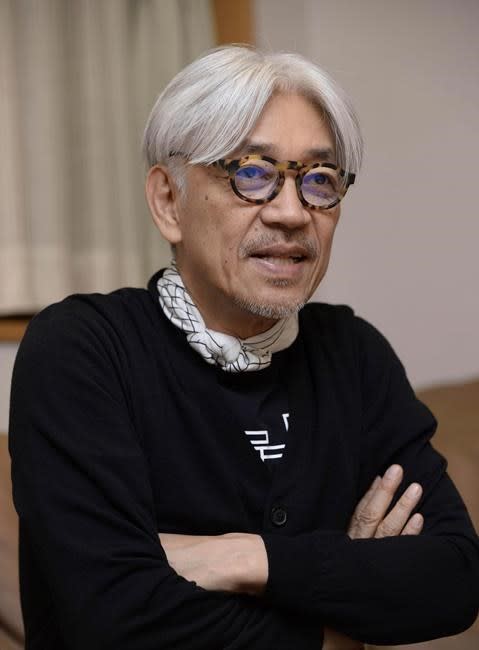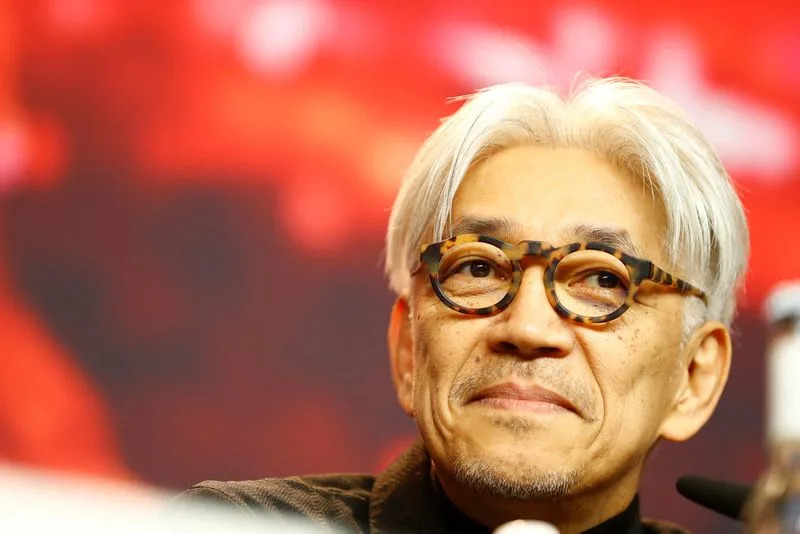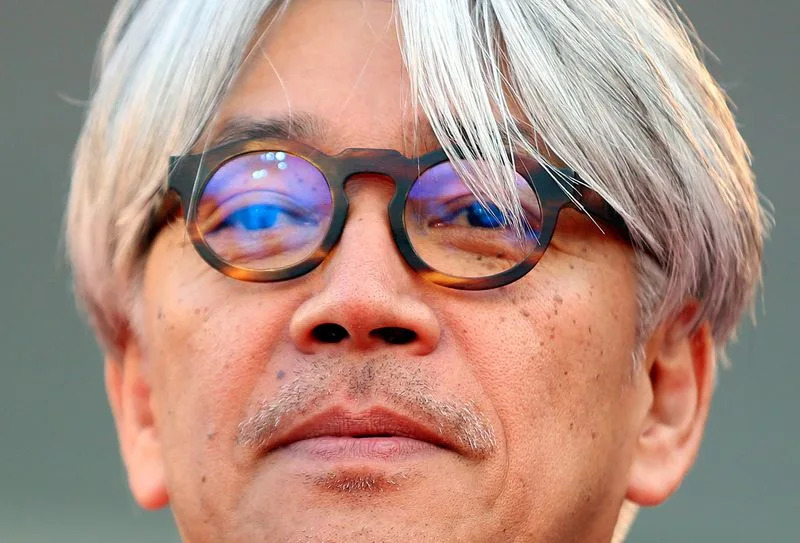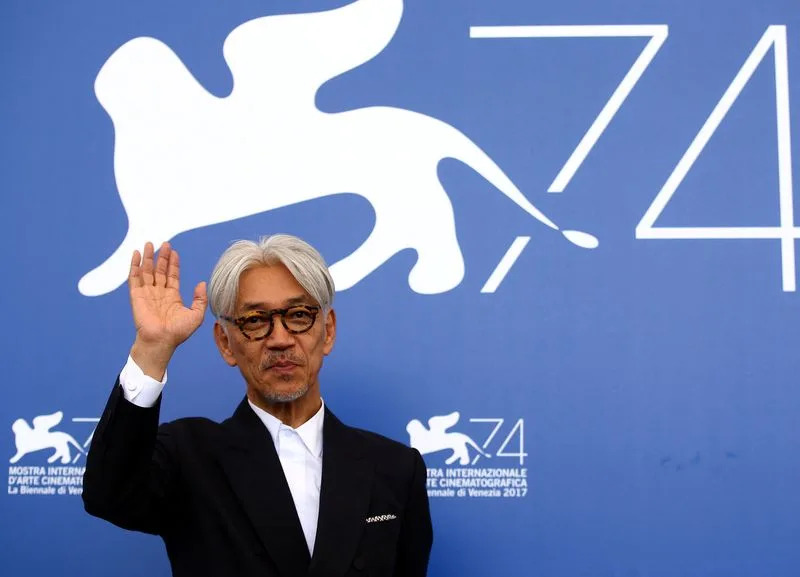Ryuichi Sakamoto, Japanese musician and film composer, dies

Sun, April 2, 2023
TOKYO (AP) — Ryuichi Sakamoto, a world-renowned Japanese musician and actor who composed for Hollywood hits such as “The Last Emperor” and “The Revenant,” has died. He was 71.
Japan’s recording company Avex said in a statement Sunday that Sakamoto died on March 28 while undergoing treatment for cancer.
He was first diagnosed with throat cancer in 2014. In 2022, he revealed that he had terminal cancer, a year after he disclosed suffering from rectal cancer.
Sakamoto was a pioneer of the electronics music of the late 1970s and founded the Yellow Magic Orchestra, also known as YMO, with Haruomi Hosono and Yukihiro Takahashi.
Takahashi died in January.
Despite his battle with cancer, Sakamoto released a full-length album “12” on his 71st birthday in January, stating that composing had a “small healing effect on my damaged body and soul,” according to the official statement released with the latest album.
He was a world-class musician, winning an Oscar and Grammy for the 1987 movie “The Last Emperor.”
Sakamoto was also an actor, starring in the BAFTA-winning 1983 film "Merry Christmas, Mr. Lawrence.”
He was mostly based in New York in recent years, though he regularly visited Japan.
Born in Tokyo in 1952, Sakamoto started studying music at the age of 10 and was influenced by Debussy and the Beatles.
The statement from Avex said that despite his sickness, when he was feeling relatively well, he kept working on his music in his home studio. “To his final days, he lived with music,” it said.
The statement expressed gratitude to the doctors who had treated him in the U.S. and Japan, as well as to all his fans around the world. It referenced the words Sakamoto loved: “Ars longa, vita brevis,” which refers to the longevity of art, no matter how short human life might be.
Sakamoto also left his mark as a pacifist and environmental activist. He spoke out against nuclear power following the March 2011 Fukushima nuclear plant meltdowns caused by an earthquake and tsunami.
He took part in rallies and made speeches in Tokyo, and was among a group of respected Japanese artists, like the Nobel-winning novelist Kenzaburo Oe, who were not afraid to take an unpopular stand on political issues.
In a July 2012 rally, he got up on stage and read from notes on an iPhone, warning Japan not to risk people’s lives for electricity.
“Life is more important than money,” he said in Japanese, then added in English, “Keeping silent after Fukushima is barbaric.”
He also appeared in advertising for Nissan electric cars, although he acknowledged he got a bashing for being so commercial. At his home in New York, he gets electricity from a company that relies on renewables, he said.
“How we make electricity is going to diversify, with fossil fuel and nuclear power declining,” Sakamoto told The Associated Press in an interview in 2012. “People should be able to choose the kind of electricity they want to use.”
Funeral services have been held with family and close friends, the Avex statement said.
Sakamoto is survived by his daughter Miu Sakamoto, a musician. She posted on her Instagram the years her father had lived — from Jan. 17, 1952, to March 28, 2023 — and a photo of a worn out, half-broken piano. He was separated from his former wife, singer and composer Akiko Yano.
___
Associated Press writer Juwon Park in Seoul, South Korea, contributed to this report.
Yuri Kageyama And Mari Yamaguchi, The Associated Press
Japan's Ryuichi Sakamoto, composer of 'The Last Emperor' score, dies aged 71
Elaine Lies
Sun, April 2, 2023



Japanese musician and composer Sakamoto waves during a photocall for the movie "Ryuichi Sakamoto: Coda" at the 74th Venice Film Festival in Venice
By Elaine Lies
TOKYO (Reuters) - Ryuichi Sakamoto, the Oscar-winning Japanese composer famed for his scores for "The Last Emperor", "Merry Christmas Mr. Lawrence" and other epic films, has died aged 71.
Sakamoto was also known for his acting, and for his work with the pioneering electronic music band Yellow Magic Orchestra (YMO) which he co-founded.
"He lived with music until the very end," Avex, the recording company he worked with, said on its website. He had been suffering from cancer, but kept working in his home studio whenever his health allowed, the statement added.
He died on March 28, Avex said.
Introduced to the piano as a toddler, Sakamoto lived for music. As a high schooler, he rode on Tokyo commuter carriages so packed nobody could move, amusing himself by counting all the different sounds the train made along the way.
Sakamoto, who described French composer Claude Debussy as his hero, studied ethnomusicology at the Tokyo National University of Fine Arts and Music, with particular interest in the traditional music of Japan's Okinawa prefecture as well as Indian and African musical traditions.
"Asian music heavily influenced Debussy, and Debussy heavily influenced me. So the music goes around the world and comes full circle," he told WNYC public radio in 2010.
Embracing electronic music, he and fellow studio musicians Haruomi Hosono and Yukihiro Takahashi formed YMO in 1978. The band's groundbreaking use of a vast array of electronic instruments brought both domestic and global success.
Sakamoto's first score was for the 1983 film "Merry Christmas Mr. Lawrence", in which he also played the commandant of a prisoner of war camp, starring alongside David Bowie. The score went on to win a BAFTA.
His most celebrated work was 1987's "The Last Emperor" - a film in which he also acted. The score won an Oscar, a Grammy and a Golden Globe.
Fans posted tributes on social media.
"Rest in peace Maestro. Your music enriched our lives and changed our view of the world around us and within us," read one message on the Twitter account @elhichri0.
Sakamoto, who was an anti-nuclear campaigner and environmental activist, took a break from work in 2014 for about a year to be treated for throat cancer. Though cured of that after years of treatment, he announced on his website in January 2021 that he had been diagnosed with rectal cancer.
In December 2022, Sakamoto gave what was clearly meant to be a farewell concert for his fans, broadcast online.
"My strength has really fallen, so a normal concert of about an hour to ninety minutes would be very difficult," he said in an online message several days before.
"As a result, I've recorded it song by song and edited it together so it can be presented as a regular concert - which I believe can be pleasurable in the normal way. Please, enjoy."
(Reporting by Elaine Lies; additional reporting by Kiyoshi Takenaka; Editing by Christopher Cushing, Edwina Gibbs and Andrew Heavens)
Elaine Lies
Sun, April 2, 2023



Japanese musician and composer Sakamoto waves during a photocall for the movie "Ryuichi Sakamoto: Coda" at the 74th Venice Film Festival in Venice
By Elaine Lies
TOKYO (Reuters) - Ryuichi Sakamoto, the Oscar-winning Japanese composer famed for his scores for "The Last Emperor", "Merry Christmas Mr. Lawrence" and other epic films, has died aged 71.
Sakamoto was also known for his acting, and for his work with the pioneering electronic music band Yellow Magic Orchestra (YMO) which he co-founded.
"He lived with music until the very end," Avex, the recording company he worked with, said on its website. He had been suffering from cancer, but kept working in his home studio whenever his health allowed, the statement added.
He died on March 28, Avex said.
Introduced to the piano as a toddler, Sakamoto lived for music. As a high schooler, he rode on Tokyo commuter carriages so packed nobody could move, amusing himself by counting all the different sounds the train made along the way.
Sakamoto, who described French composer Claude Debussy as his hero, studied ethnomusicology at the Tokyo National University of Fine Arts and Music, with particular interest in the traditional music of Japan's Okinawa prefecture as well as Indian and African musical traditions.
"Asian music heavily influenced Debussy, and Debussy heavily influenced me. So the music goes around the world and comes full circle," he told WNYC public radio in 2010.
Embracing electronic music, he and fellow studio musicians Haruomi Hosono and Yukihiro Takahashi formed YMO in 1978. The band's groundbreaking use of a vast array of electronic instruments brought both domestic and global success.
Sakamoto's first score was for the 1983 film "Merry Christmas Mr. Lawrence", in which he also played the commandant of a prisoner of war camp, starring alongside David Bowie. The score went on to win a BAFTA.
His most celebrated work was 1987's "The Last Emperor" - a film in which he also acted. The score won an Oscar, a Grammy and a Golden Globe.
Fans posted tributes on social media.
"Rest in peace Maestro. Your music enriched our lives and changed our view of the world around us and within us," read one message on the Twitter account @elhichri0.
Sakamoto, who was an anti-nuclear campaigner and environmental activist, took a break from work in 2014 for about a year to be treated for throat cancer. Though cured of that after years of treatment, he announced on his website in January 2021 that he had been diagnosed with rectal cancer.
In December 2022, Sakamoto gave what was clearly meant to be a farewell concert for his fans, broadcast online.
"My strength has really fallen, so a normal concert of about an hour to ninety minutes would be very difficult," he said in an online message several days before.
"As a result, I've recorded it song by song and edited it together so it can be presented as a regular concert - which I believe can be pleasurable in the normal way. Please, enjoy."
(Reporting by Elaine Lies; additional reporting by Kiyoshi Takenaka; Editing by Christopher Cushing, Edwina Gibbs and Andrew Heavens)
No comments:
Post a Comment